#wife of james monroe
Text
The fun part of digging into history from multiple different sources is that you start to piece together information about people across different eras, until history starts to feel like a massive crossover event involving surprise guest stars.
For example:
The book about Lincoln's Cabinet presents William Seward as the expected Republican candidate for the 1860 election. As they discuss his backstory I'm like, "Oh, he's Seward the anti-slavery New York Whig who influenced Zachary Taylor." And then they mention Seward becomes Lincoln's Secretary of State.
And I'm like
Wait a minute...
SEWARD'S FOLLY???
HE'S BEEN THE ALASKA MAN THIS WHOLE TIME???
An emergency trip to Wikipedia confirmed that he was. Which feels much stranger than it probably should, but in high school, all the Alaska stuff was presented as completely separate from the Civil War, so it's taken me a long time to put the pieces together. Still kind of fun to make connections like that, though.
#random thought of the day#history is awesome#presidential talk#a similar thing is learning that historical figures had lives before and after their most famous periods#like john quincy adams being monroe's secretary of state#and then serving in the house of representatives as a strident anti-slavery voice until he dies on the house floor in the 1840s#(and lincoln was there cuz it happened to be his one term as a representative)#or that dolly madison helped jefferson with first lady hostess duties because his wife had died#and then played a major social role for several presidencies afterward#or that james monroe's wife helped rescue lafayette's wife from the guillotine#this is just people living their lives but these facts feel like plot twists#because history gets fragmented into a bunch of different groups of facts#so you can forget how it all fits together
69 notes
·
View notes
Text
Facts about James Madison Vol. 1
(Because I’m bored and everyone should be enlightened with some James Madison)
James Madison walked with a small spring in his step, considerably to make himself appear slightly taller than he was
Because of the soggy and mushy climates surrounding William and Mary College in Williamsburg, James Madison instead went to the College of New Jersey (Princeton) for his health
James Madison, along with Thomas Jefferson and James Monroe, created the Republican Party (also known as the Democratic Republican Party or Jeffersonian Republican Party) in 1792
James Madison’s wife Dolley Payne was gifted a pet parrot named Polly— who was notorious for being aggressive towards humans (thus biting Madison’s finger in front of guests during one occasion)
James Madison personally knew Aaron Burr and Philip Freneau ever since they were all in college
James Madison and Alexander Hamilton, reported by a girl walking down the street, could once be seen playing with a neighbor’s pet monkey
James Madison had a long-lasting five decade friendship with Thomas Jefferson
James Madison would eventually have a fall-out with not only Alexander Hamilton, but also George Washington over the belief of federal government and a national bank by the early 1790’s
While Thomas Jefferson in France, he and James Madison would enjoy measuring animals, comparing them to their counterparts (North American animals compared to their similar species in Europe), and telling each other of their findings
James Madison, while he was in college, would last on a five-hour sleep schedule due to studying until he collapsed from a breakdown (this made him stay at the college for an extra year to restore his weakened health)
James Madison had never been good with marital relationships (being allegedly rejected by Freneau’s sister Mary and dumped by Kitty Floyd in the 1780s), but eventually married the 26 year-old widow Dolley Payne in 1794
James Madison was a MASSIVE fan of ice cream, along with his wife Dolley, whose favorite flavor was oyster
#founding fathers#colonial america#history#james madison#alexander hamilton#thomas jefferson#george washington#philip freneau#dolley madison#unfortunately the mary freneau situation is only rumored and doesn’t have any documents or real evidence#so it’s impossible to know if it was actually true#but oh well#gotta love paragraph facts woohoo
59 notes
·
View notes
Note
Books that feel like old hollywood movies?
my faves!
♡ ex-wife by ursula parrott
♡ rules of civility by amor towels
♡ miss pettigrew lives for a day by winifred watson
♡ auntie mame by patrick dennis
♡ gigi by colette
♡ the lady of the camellias by alexandre dumas fils
♡ gentlemen prefer blondes by anita loos
♡ breakfast at tiffany’s by truman capote
♡ rebecca by daphne du maurier
nonfiction!
♡ lana: the lady, the legend, the truth by lana turner
♡ marilyn monroe private and undisclosed & the girl: marilyn monroe, the seven year itch and the birth of an unlikely feminist both by michelle morgan
♡ dream lovers by dodd darin
♡ rita hayworth: the time, the place and the woman by john kobal
♡ audrey hepburn, an elegant spirit by sean hepburn ferrer (more of a coffee table book, but it’s great!)
♡ audrey at home by luca dotti (it’s just a must-have)
♡ myrna loy: being and becoming by james kotsilibas-davis & myrna loy
♡ evenings with cary grant by nancy nelson
♡ ava: my story by ava gardner
#i collect old hollywood coffee table books too if anybody is interested in those as well!#they make great christmas gifts#ask#books
33 notes
·
View notes
Note
isn't there like a backstory with the actress who played Calendar Girl also being an advocate against agism in Hollywood
Yes. Sela Ward provided the voice for Page Monroe. Ward is a well established actress best known for a television show called Sisters. She also played Harrison Ford’s doomed wife in the movie version of The Fugitive.
As the story goes, she was considered for a role in the James Bond movie Golden Eye, but lost the role because she was deemed too old… despite being nearly ten years junior to the film’s star, Pierce Brosnan. The experience left quite a mark on Ward, who would go on to develop and produced a documentary called ‘The Changing Face of Beauty.’ The film focuses on American obsession with youth and how this has an especially negative effect on women, their self-esteem and psychological wellbeing.
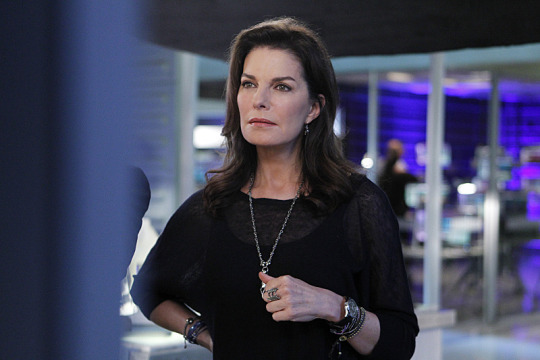
The Mean Seasons episode of The New Batman Adventures also focused on how models and actresses can come to feel disposable once they reach a certain age. Considering the similarity of themes between Mean Seasons and The Changing Face of Beauty, having Ward voice Monroe seems a particularly apt casting decision.
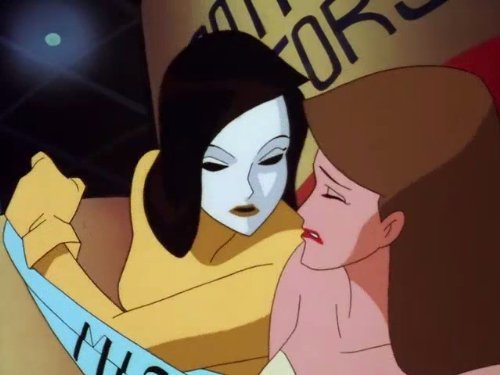
20 notes
·
View notes
Text
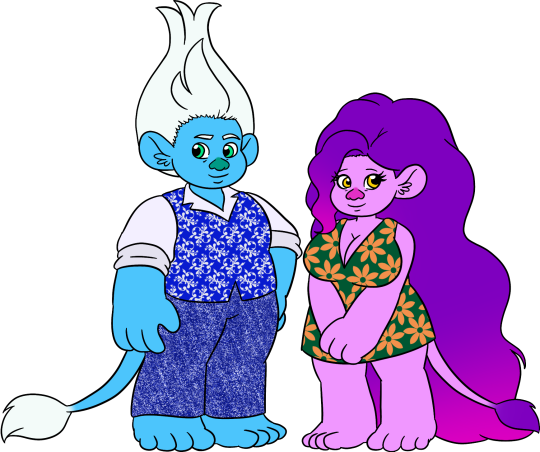

I’m taking a break on making the fairytale art to draw what Queen Rose’s parents look like. Here’s the prince of the Platinum Trolls, Prince Bastion and his pop troll wife, Jasmine.
As the second born child and the only prince in his family, Bastion is expected to inherit the throne. He is fascinated by the six troll tribes that his parents ruled over and he wanted to try and help them but it was forbidden because of the dangers that is happening outside their kingdom. After the death of the king, Bastion disappeared and his mother, Queen Celestia became the sole ruler because his older sister and his younger sisters refused the crown. Bastion was exploring the troll kingdom for months until he found the troll tree, where the pop trolls live. There, he fell in love with a pop troll named Jasmine and they got married. Upon encountering a Bergen nearby, Bastion knew what is going to happen in the troll tree so he told Jasmine about his encounter and they knew that her tribe would be attacked by the same creature so Bastion and Jasmine sneaked went back to his home kingdom and placed the egg in the castle doorstep, where his mother found it and cared for until Rose hatched.
They had Linden’s egg a year after laying Rose’s egg but they kept a distance from the Troll Tree until the Bergens caught the pop trolls. The couple were able to keep in touch by secretly delivering plans and letters to the pop trolls, which helped them escape from Bergen Town. The couple settled down in Pop Village with their son and had twin daughters, Aurora and Twilight. Even though their three younger children are traveling all over the world, they have time to spend with their parents. Bastion and Jasmine longed to see their eldest child again but they have to wait until the time is right.
In the human au, Brandon Madrigal and Jasmine Madrigal née Valiente are frequently traveling because of their jobs, which result in Linden, Aurora, and Twilight going to different schools. They left Rose with Celestia as a baby because even though they love her, they can’t juggle with taking care of her while traveling and doing their jobs.
My VC for Prince Bastion is James Monroe Inglehart while Jasmine’s vc is Nicole Scherzinger.
14 notes
·
View notes
Text
☮️ masterlist ☮️
❤️=smut
🤍=fluff
❤️🩹=angst
-metallica (current and past members)
kirk hammett
dating load era kirk headcannons 🤍
face sitting ft. labret piercing ❤️
load era kirk nsfw headcannons ❤️
kirk calling you a good girl ❤️
dilf kirk nsfw headcannons ❤️
sweet but psycho (meeting kirk at a party) ❤️
helping kirk with vampire makeup 🤍
james hetfield
tba era james headcannons 🤍❤️
jason newsted
dating jason headcannons 🤍❤️
dave mustaine
dave fingering you after a long day ❤️
dave nsfw headcannons ❤️
soft sex with dilf dave ❤️
dave distracts you from the storm ❤️
size kink dave ❤️
dave eating you out ft. hand holding ❤️
dave x pregnant wife reader 🤍
dilf dave nsfw headcannons ❤️
favorite positions headcannons ❤️
dave giving you a massage & sex ❤️
dave manhandling you/size kink ❤️
dave with hair pulling kink ❤️
daddy kink dave ❤️
-Guns N’ roses (appetite for destruction lineup)
duff mckagan
daddy kink duff ❤️
-Hanoi Rocks (original lineup)
sami yaffa
sami nsfw alphabet ❤️
sami x tall reader 🤍
sami aftercare headcannons 🤍❤️
sami x famous!reader meet at a party 🤍
sami x pregnant reader 🤍
sami/nasty x oblivious!reader headcannons 🤍
michael monroe
michael steals your clothes 🤍
michael nsfw headcannons ❤️
doing each others makeup 🤍
-grazie
12 notes
·
View notes
Text


Brigadier General Hugh Mercer died on January 12th 1777 after being wounded at the Battle of Princeton.
Historians argue that, had it not been for his untimely and grisly death at the Battle of Princeton in 1777, Hugh Mercer, born in Aberdeenshire, would have been a greater leader than Washington and would rank as one of the greatest American heroes of all time.
Born on January 17h, 1726, at the manse of Pitsligo Kirk in Roseharty, Scotland, Hugh Mercer was the son of Reverend William Mercer and his wife Ann. At the age of 15, he left home to attend Marischal College at the University of Aberdeen to study medicine. Graduating as a doctor, he practiced locally until the arrival of Prince Charles Edward Stuart and the beginning of the 1745 Jacobite Uprising.
Rallying to the Prince’s colours, Mercer became an assistant surgeon in the Jacobite Army. He remained in this service until the Battle of Culloden. Mercer was forced to flee Scotland for America in 1747. Arriving in Philadelphia, he settled on the Pennsylvania frontier and returned to practising medicine. by 1758 he was, like many Scots who fled, serving in the British army, battling Shawnee and Delaware Indians, Mercer and his men took part in Lt. Colonel John Armstrong’s raid on Kittanning on September 8th, 1756. and became separated from his men. Alone following the battle, he made his way 100 miles on foot back to Fort Shirley where he received medical attention and was heralded a hero and promoted to the rank of Captain, it was here that Mercer was to become good friends with a man that would shape the remaining years of his life, also a Colonel at the time, his name was George Washington.
Before you start questioning his loyalty with being in the British army remember Washington was also in their pay at this time. After the 7 year war he settled back into private practice but 15 years later was elected as a Colonel of the Minute Men of Spotsylvania a Militia that would play an important part in the American Revolution, he had initially excluded from the elected leadership and branded a “northern Briton,” later being appointed Colonel in the Virginia Line part of the Continental Army which rose in revolt against British rule after the outbreak of the American Revolutionary War, once again he was fighting against “the auld enemy”.
One of the officers under Mercer was future president James Monroe. He rode through the ranks to Brigadier General distinguishing himself and involving himself with George Washington battle plans until January 3rd while on their way to The Battle of Princeton leading a vanguard of 350 soldiers, Mercer’s brigade encountered two British regiments and a mounted unit. A fight broke out at an orchard grove and Mercer’s horse was shot from under him. Getting to his feet, he was quickly surrounded by British troops who mistook him for George Washington and ordered him to surrender. Outnumbered, he drew his saber and began an unequal contest. He was finally beaten to the ground, then bayoneted repeatedly—seven times—and left for dead.
When Washington learned of the British attack and saw some of Mercer’s men in retreat, he himself entered the fray. Washington rallied Mercer’s men and pushed back the British regiments, but Mercer had been left on the field to die with multiple wounds to his body and blows to his head. (Legend has it that a beaten Mercer, with a bayonet still impaled in him, did not want to leave his men and the battle and was given a place to rest on a white oak tree’s trunk, while those who remained with him stood their ground. The tree became known as “the Mercer Oak” and is the key element of the seal of Mercer County, New Jersey.
When he was discovered, Mercer was carried to the field hospital in the Thomas Clarke House (now a museum) at the eastern end of the battlefield. In spite of medical efforts by Benjamin Rush, Mercer was mortally wounded and died nine days later on January 12, 1777.
In 1840 he was re-buried at Philadelphia’s Laurel Hill Cemetery. Because of Mercer’s courage and sacrifice, Washington was able to proceed into Princeton and defeat the British forces there. He then moved and quartered his forces to Morristown in victory.
The second picture show a painting entitled George Washington at Battle of Princeton features in the foreground Hugh Mercer lying mortally wounded in the background, supported by Dr. Benjamin Rush and Major George Lewis holding the American flag. This portrait is the prize possession of Princeton University.
16 notes
·
View notes
Text


Spectacular SheZow Characters: 2
Boxter James Hamdon: Boxter is Gai(Damien) and Kelly's dad and the alternative version of Boxer Hamdon. He is a Police officer with a slight grudge against SheZow, this is due to him and the other officers of Megadale are underappreciated by the citizens while SheZow gets all the credit, he also hates how the new SheZow does "her" job as sometimes "her" actions lead to people getting hurt. Aside from his jealousy, Boxter is a great father and husband and tries his hardest to look after his family.
Droosha Leela Hamdon: Droosha is Gai(Damien) and Kelly's Mum and the alternative version of Droosha Hamdon. Droosha was encouraged at a young age to be an artist by her aunt Agnes, she is a lover of music and a bit of a pacifist, though that doesn't mean she can't stand up for herself and her family. Droosha is a great mother and wife who is always ready to give people some helpful advice.
(Great aunt) Agnes Lynne Monroe/SheZow: Agnes is Droosha's aunt/ Gai and Kelly's great aunt and is the alternate version of Aunt Agnes. Before Gai because SheZow, Agnes took the role of the heroine, she also is responsible for writing the comic series based on her adventures. Unfortunately, Agnes passed away from a mysterious illness when she was 64 and gave her house and cat Lyla to her Niece.
Lyla the Cat: Lyla is a Calico cat that previously owned by Agnes in the AU. She was given to Droosha and the family along with the house to look after. Lyla is quite aware that her previous owner was SheZow, in fact, Lyla used to hang out in the She-Lair whenever Agnes was working. She still hangs out in the lair with the kids and Sheila sometimes though it isn't as common as she used to when Agnes was alive.
SheZow/characters belong to Obie Scott Wade
[Spectacular SheZow is a FANMADE series that takes place in an alternate universe. It follows the same concept as the original series but with a few differences in it's own story.]
[⚫❌PLEASE DO NOT STEAL/TRACE OR REPOST (Without my permission) MY ARTWORK ❌⚫]
19 notes
·
View notes
Note
You mention in a reblog that it would have been very easy for Hamilton's family-in-law and enemies to discover his real birthdate. Genuinely, though - how? Records, if they were accurate or even kept, were inaccessible to them. Hamilton's West Indies contacts were all clearly muddled about his birth year (given the many contradictory answers - and frankly, I wouldn't know off hand when many of my close friends were born either). Surely his lying about it would have been trivially easy?
I hadn't meant by records, seeing as how we struggle to this day to find any concrete records of Hamilton's true birthyear. But yeah, his contacts. A good, but small, handful of Hamilton's associates from the West Indies were also located at New York, or the Colonies in general—And others at least remained in contact with him or his family. To name a few, Hamilton's father and cousin, Anne Mitchell, remained in contact with him, and Anne even visited and wrote to Eliza after his death. We have scarce surviving correspondence between Hamilton and his father, but if he was planning to let him move to NYC to live with them; it can be speculated that Eliza may have written a few letters to him, or he sent his own to others in New York.
Or the can of worms Edward Stevens' offers, he was Hamilton's boyhood best friend from St. Croix, and attended King's College where they attended the same class club and had shared some of the same friends, Nichoals Fish, Robert Troup, etc. If there was one person who we had to trust to know Hamilton's birthyear out of the surviving relatives or friends he had at the time, it would have likely been Stevens. Stevens's brother-in-law, James Yard, knew a good amount about Hamilton and his childhood considering later he was able to provide information for Timothy Pickering, who was planning to write a biography about Hamilton. The same one that mentions the possibility of Thomas Stevens being Hamilton's real father. Additionally, there is the Kortright family; Monroe's wife, Elizabeth Kortright Monroe, was a cousin of Hester Kortright Amory, Stevens's wife. And Elizabeth K. Monroe's uncle was one of Hamilton's employers from the Island, Cornelius Kortright, who worked with Nicholas Cruger. He helped handle Hamilton's financial dealings when he first made it to the Colonies. With all this being said, I highly doubt everyone was just keeping this a secret. Especially with their close relations to James Monroe, one of Hamilton's rivals, who could have easily used it against him.
And going back to Cruger, he would have definitely known Hamilton's contrasting age considering he was his employer at the Cruger Counting house. He also moved back to New York and saw Hamilton again, even once there were rumors spreading by the press that Hamilton could become governor with him as lieutenant governor in 1795. Catharine Church, the eldest Church daughter, married Bertram Peter Cruger, Cruger's son.
And all of Hamilton's associates from the Colonies roughly followed the 1757 belief. But you are right saying; “and frankly, I wouldn't know off hand when many of my close friends were born either.” Because as @46ten as recently added on, we are putting way too much emphasis on a birth year than what those of that day would. We value birth dates more strongly than when even as recently as a century ago, we did not. Today birth dates are now widely used for identification, but back when containing written documents was more of a hassle (As finding documents from Nevis has proven), not many were inclined to do such. In a day in age, where many families didn't even celebrate birthdays often, it wasn't much more than a passing thought for most. There is even a humorous story of Eliza forgetting JCH's birthday when he was young;
John is as industrious as usual and this Evening has ascertained that he is not more than twelve last August. I had thought him to have been thirteen but he is not more than twelve.
Elizabeth Hamilton to Philip Schuyler, [1804]

So, not only is it likely Hamilton wasn't even sure of his own birth year, but it wasn't a large deal back then. Does that mean it never would have been brought up? No, and I'm sure with all the previously mentioned close ties to Hamilton's in-laws and rivals, something would have noticeably not connected if so. And I doubt this many people were just in on Hamilton's whole facade. But it seems like a bunch of worthless mental gymnastics and risky lie for Hamilton to maintain for nearly 30+ years of his life, especially when many were out looking for anything to use against him.
#amrev#american history#historical alexander hamilton#edward stevens#james hamilton#anne mitchell#james yard#elizabeth kortright monroe#james monroe#cornelius kortright#nicholas cruger#history#birth year#queries#sincerely anonymous#cicero's history lessons#18th century#alexander hamilton
40 notes
·
View notes
Text
July
I was working on a scene within The American Icarus earlier today set In February, 1776. However as I was hitting another wall of writer’s block I was reminded that Independence Day is fast approaching, and how it was funny that I was working on TAI right then. But then I started to remember all the stuff that went down any given July for Hamilton (which I will eventually write into the series) and it hit me that July was really not this man’s best month. Case in point, in chronological order of course:
July 12th, 1776: In an attempt to fight off warships which had sailed up the Hudson that many other companies neglected in light of the recent celebrations over the publication of the Declaration of Independence, one of Hamilton’s four six-pound cannons exploded (why is unclear). The explosion killed between 1 and 6 men, and injured between 1 and 5.
July 1st, 1778: According to an account left by John Laurens, he, Hamilton, and General Baron von Steuben and his men were nearly taken prisoner by a company of British dragoons when they accidentally encountered them.
July 4th, 1779: Hamilton is informed via a letter written on this date by John Brooks that according to an unnamed person (who would be revealed to be William Gordon), a Francis Dana had stated that in a coffee house in Philadelphia, Hamilton had declared that “it was high time for the people to rise, join General Washington, and turn Congress out of doors.” This of course enraged Hamilton, who promptly sent Dana a letter on July 11th. This opening of correspondence would lead to Hamilton threatening duels.
July 2nd-4th, 1780: In a letter to his future wife, Elizabeth Schuyler, Hamilton comments that Washington had “half consented” to him traveling to Pennsylvania to meet with Laurens who was then a prisoner of war. However, it is unclear and even unlikely, that Hamilton was able to meet with Laurens at this time.
July 18th, 1795: Upon the announcement that a protest was to be held against the Jay Treaty, Hamilton positioned himself to create a counter-protest. However, his audience was less than considerate, and overpowered his speech; a rock being claimed to have been thrown at Hamilton’s head. Angered, Hamilton then stormed off, and within the hour in an attempt to stop an argument he encountered, more were created, all resulting in Hamilton taking up challenges to duels—even going as far as to challenge the entire Republican Party (or as he called them according to accounts, “the detestable faction”) to duels.
July 11th, 1797: After information of the Reynolds Affair leaked, and upon realizing he had never received a confirmation of secrecy from James Monroe who was present when he had been forced by questioning to reveal the affair and present documents, Hamilton arrived with his brother-in-law, John Barker Church, to confront Monroe. The conversation quickly became heated, with both Hamilton and Monroe jumping up from their chairs each prepared to grab pistols and meet on a dueling ground. This affair of honor was stopped however by Monroe’s friend who managed to calm the two seething men down.
July 11th, 1804: After weeks of correspondence between Hamilton, Aaron Burr, and their second’s Nathaniel Pendleton and William Van Ness, Hamilton met Burr on a cliff side in Weehawken, New Jersey to settle an issue of honor originating from comments Hamilton claimed he could not recall at a dinner he attended back in March. It is unclear of the actual details as to what occured on this dueling ground, but while Burr would walk away to return to his home and share a breakfast with a friend, Hamilton would leave with a mortal injury.
July 12th, 1804: Surrounded by the presence of his family and friends, Hamilton passed away about 2 p.m., EST, from the injury received the previous day.
See? Truly wild. I am writing this late at night, so if there is something I messed up on or missed entirely, please don’t hesitate to let me know. This is just a silly observation with all the stuff I have to keep tabs on in working on The American Icarus lol.
#grace’s random ramble#alexander hamilton#amrev#american history#july#historical alexander hamilton#the american Icarus#TAI
23 notes
·
View notes
Note
HI
CAN YOU TELL ME EVERYTHING YOU KNOW ABOUT THE REYNOLDS AFFAIR AND PAMPHLET
I sure can.
First, I want to talk about Maria, because I think a great injustice is done to her in general.
Maria Lewis, which is what I will be calling her, was born in New York City on March 30, 1768. She was one of eleven children, six half siblings and five full. Maria grew up literate, but largely uneducated. She was married to James Reynolds when she was 15, on July 28, 1783. He had served in the revolution in the commissary department (which, if you know anything about the commissary, it was virtually useless), and was several years older than Maria. He was constantly asking the government for money. They had one child, Susan, born on August 18, 1785.
Before 1791, James Reynolds moved with his wife and child from NY to Philadelphia. In summer of 91, Maria visited Alexander Hamilton at his residence in Philadelphia asking for help because her abusive husband had abandoned her. Hamilton had the means to assist her in moving back to NYC, and arranged a later meeting to give her the money. He arrived at her boarding house, she brought him to her bedroom, and, according to him, “Some conversation ensued from which it was quickly apparent that other than pecuniary consolation would be acceptable.” She was 23 years old. He was 34.
The affair continued throughout the summer and fall of 1791 while Hamilton’s family was in Albany, NY. After a short while, Maria informed Hamilton that her husband sought reconciliation, and she agreed without ending the affair. She obtained an interview for Reynolds, in which he applied for a position in the Treasury, which Hamilton refused.
Hamilton exhibited that he wanted to end the affair on December 15, 1791, when Maria sent him a letter from Reynolds.
“I have not the time to tell you the cause of my present troubles; only that Mr. Reynolds has wrote you this morning and I know not whether you have got the letter or not and he had swore that if you do not answer, or if he does not see or hear from you today, he will write to Mrs. Hamilton. He has just gone out and I am alone. I think you had better come here one moment that you may know the cause, then you will the better kmow how to act. Oh, my God, I feel more for you than myself and wish I had never been born to give you so much unhappiness. Do not respond to him; not even a line. Come here soon. Do not send or leave any thing in his power.”
The affair ended for a time in December, but began again after Reynolds needed more money, and manipulated Maria into restarting the affair. Reynolds would write to Hamilton as a “friend”, and Hamilton would send $30. The last loan was in June 1792.
Reynolds was imprisoned for forgery in November of that year, and wrote to Hamilton for assistance, who denied all requests for money from both Reynolds and Maria.
James Monroe, Frederick Muhlenberg and Abraham Venable, rivals of Hamilton, visited Reynolds in jail after being made aware that he had contact with Hamilton by Reynolds’ partner in crime. Reynolds didn’t mention anything specific, but hinted at Hamilton’s public misconduct. The congressmen then interviewed Maria who maintained Reynolds’ accusation of speculation on Hamilton’s part.
James Callendar, a newspaper writer, also heard of this accusation, and published it in The History of the United States for 1796. Hamilton rebuked it with the Reynolds Pamphlet that cleared his name, but also placed the majority of the blame for the affair on Maria. It is likely that the events stated in the Pamphlet are accurate, however Hamilton phrased the narrative to make Maria appear as a villainous seductress, in order to keep public scrutiny away from himself. He would have known to do this, because it was the same thing his mother’s first husband did to his mother before his birth. These situations are very similar, however the consequences Rachel Faucette faced were much harsher, which is likely why Hamilton felt justified in mirroring Johann Lavien’s actions.
It is clear Maria is a victim in this circumstance, as she was very young, and was being emotionally, financially, and possibly physically abused by Reynolds. It is also likely that Reynolds threatened abuse to her daughter if she did not comply with his demands. She was publicly scorned after the Reynolds Pamphlet. Hamilton is not the victim.
In 1793, Maria Reynolds petitioned for a divorce with the assistance of Aaron Burr, who offered her and her daughter a place to live in order to fully escape Reynolds. Before the divorce was finalized, she went to live with Reynolds’ partner-in-crime, Jacob Clingman, whom she married in 1795. She settled in Alexandria, Virginia, then Britain after facing public scrutiny over the Pamphlet.
Maria became the housekeeper of Dr. Matthew. Peter Grotjan reported that he had met Maria, and she claimed to have written a pamphlet of her own with her side of the story. It was never published, and there is no other evidence of it’s existence. In 1800, Susan was sent to a Boston boarding school after Burr petitioned William Eustis to help her.
Maria married Dr. Matthew in 1806. Susan Reynolds came to live with her mother in 1808, and spent several years in Philadelphia. Susan was unhappily married several times. She had two daughters.
Maria Lewis died as Maria Matthew on March 25, 1828.
Hope this helps!
#alexander hamilton#maria reynolds#the reynolds pamphlet#the reynolds affair#james reynolds#aaron burr#history#american history#amrev#amrev history
61 notes
·
View notes
Text
The Artist
The epistolary work I found myself working on this morning... someone writing about Savvie Marcoset and her, uh, misunderstood genius.
See if you can find all the places where our writer thinks he’s being subtle. Jax belongs to @comfy-whumpee
The Motherfucking Gallaghers masterlist
-
The art vs. the artist: Separating Savannah Marcoset’s music from her misdeeds
By: Elliott Monroe Williams
-
The problems caused by our modern obsession with “canceling” imperfect people are multiplying every day, touching every single aspect of our lives. Whether it’s a new scandal involving a professional athlete, celebrities like James Corden or Matt Damon, or even someone who simply said the wrong thing in a public place where their mistake was recorded and shared across the world, it seems like every day brings another person who “deserves” to be “canceled”.
What does it mean to be “canceled”? The MacMillan dictionary defines canceling, the verb, as withdrawing support from or ceasing to engage with a celebrity or public figure whose views you dislike.
It’s one thing to make a choice not to provide further opportunities for a platform or profit to someone whose views or actions you abhor. I support such a choice wholeheartedly and have made similar decisions myself. But does someone’s distasteful action or viewpoint mean you can’t enjoy their creations if you already loved them? Can you still read your favorite books if the author turns out to have repugnant views they simply won’t stop shouting to anyone who will listen? Can you watch the Tour de France during a doping scandal? Can you love a book written in the 19th century after discovering that the author of the book was abusive to his family?
In the case of classical music, is there any truly brilliant composer who wouldn’t be “canceled” if they were alive today?
Does enjoying their compositions mean signing off on their crimes?
From Beethoven through Guesaldo, composers have always behaved badly
They often say instability and genius walk hand-in-hand, and many of our most beloved historical composers were criminals in their own day. Ludwig van Beethoven was famously once arrested for and charged with prowling and vagrancy after walking the chilly streets with no hat, no coat, and no form of identification. He peered through the windows of Viennese citizens’ homes until the constable was called, and a local musician had to identify him.
Johann Sebstian Bach spent a month in jail for terminating a contract with an employer. Pietro Mascagni was arrested for embezzlement (although he was later acquitted of any crime) and was an enthusiastic supporter of dictator Benito Mussolini. While legal, you could argue that such open support for the authoritarian leader would likely lead to being “canceled” today.
Should a man who supported such a dictatorial government in his own time be held as someone whose music must be shunned even today, decades after his death?
Carlo Guesaldo, whose eerie madrigal compositions offered modernist sound centuries ahead of its time, was even known to have murdered his philandering wife and her lover, and potentially also his father-in-law, although this is likely a later embellishment. While he was never charged with the crime, he nonetheless did not deny it.
These men were brilliant individuals with eccentric personal lives. Does the decision to commit a crime mean we cannot enjoy their work without approving of every action they’ve undertaken? What if we speak not of an historical composer, but a modern woman whose crimes have made her a household name?
What about Savannah Marcoset?
A brilliant violinist convicted of serious crimes
Savannah Marcoset is arguably the most famous classical performer and composer worldwide, but it is unfortunately not for her music. She is currently serving a sentence of life without parole after being convicted of a series of crimes, including multiple counts of false imprisonment in the first degree, a variety of assault convictions, and also for obstruction of justice and attempting to intimidate a witness and jury tampering.
Already well-known as a childhood prodigy at her chosen instrument, the violin, Ms. Marcoset moved into releasing recordings of her own original compositions at the tender age of fifteen. By twenty, she was selling out venues like Carnegie Hall. Classical music aficionados declared her the second coming of Elliott Gould, a new eccentric genius who kept to herself off the stage but shone like a diamond under the lights, with her violin in her hand.
Shortly after finishing her undergraduate degree at the prestigious Juilliard School, she lost her beloved parents in a tragic, still unsolved aviation incident. In the chaos of her grief, she forgot to eat, to sleep, and even to pursue the music that had given her life such meaning before. Her uncle, in an effort to help her regain stability, provided her with an individual who would clean the home, keep her safe, and ensure she had someone to talk to through the worst of her grief.
To her shock and dismay, the man provided to her as an employee and servant turned out to be illegally purchased through a recently-uncovered human trafficking network in the UK.
By all accounts and by Ms. Marcoset’s admittance at her first trial, Jackson Gallagher - the man who had been abducted, sold into modern slavery, and ended up Savannah Marcoset’s unwitting servant - spent more than a year in her employ before the situation was discovered when he was able to pass a message on to his father when Ms. Marcoset took him to the UK to visit.
Gallagher was freed and sent back home shortly after, and Ms. Marcoset spent years in prison after conviction. She was granted parole on the condition that she remain under virtual house arrest, only able to leave for performances, recording sessions, and other professional matters. She also was forced to wear an ankle monitor so that her location could be tracked at all times.
Ms. Marcoset never left her home except for the short trips for performances that she approved with her parole officer. Journalists and reporters came to her home to interview her, and none saw any sign of anything amiss. And yet, shortly after her release, Jackson Gallagher disappeared from his father’s apartment. Declared missing and eventually presumed deceased, Gallagher would only resurface years later, showing up on his father’s front step with two small children and a story.
Savannah Marcoset, it turned out, had been hiding what she called her ‘husband’ and their eventual children together in her family’s home all along.
She was eventually tried and convicted of her crimes, and will never again see the outside of prison walls. She attempted to publish a memoir, whose release was canceled after intervention by Jackson Gallagher’s legal representation, Collins McKay of McKay, Kline, and Benson. McKay successfully argued it would cause emotional harm to her two children, the project was canceled, and Ms. Marcoset’s memoir languishes in a safety deposit box in an undisclosed bank. Ms. Marcoset continues to grant interviews, however, and has recently recorded and released a new album, which will be released in February, titled Permanent Pause.
With the news of her new album, interest in her story has been renewed. Many classical music fans are calling for a boycott of her work, while others make the point that the proceeds will go entirely to a trust that will profit not Marcoset herself, but her two children by Gallagher.
Can we appreciate good music from bad people?
If misdeeds must be eternally punished, even as the person might grow and change with time, this insists that someone is never better than the one time they were at their worst. Do we judge Beethoven by his slovenly housekeeping or even his way of looking into the homes of others while wandering the streets?
Do we cease to listen to Mozart because of his propensity for arrogance and a sometimes less than pleasant demeanor? Do we turn away from Guesaldo’s genius when learning of his single act of double-homicide?
No, we do not.
We acknowledge unfortunate realities, of course, but even so we equally acknowledge the great men and women of music as part and parcel of their time and place. Noblemen in a time when nobility lived above the common law applied to others, composers during the days when what we call classical music was what everyone revered and flocked to see. Celebrities of their time who acted within the more lax boundaries of their day.
I would argue Savannah Marcoset, in some ways, is the same.
Sure, she is a modern musician, but she was raised by a family whose criminality only recently came to light, and continues to insist that she was unaware of her parents’ true occupations until after their deaths. For someone who grew up in a household in which servants were, by and large, unpaid and had been with the family for generations, is it so strange that her sense of what counts as ‘freedom’ was so wildly out of touch?
Of course, I don’t excuse her crimes, and the law has duly punished her for them. She will never see the outside of prison walls, and is only given a single hour each day to exercise outdoors. Jackson Gallagher has successfully ensured she has no legal rights to her two children whatsoever and will likely never see them again. While she is allowed visitation, her visitors must be approved by the prison warden. Beyond her interactions with guards and staff, she lives an utterly solitary life.
She even admitted in a recent interview with a journalist in People Magazine that she doesn’t even know what her children look like, and worries often about them, with no chance to settle maternal worries, as Gallagher has resettled back in the UK.
In many ways, she has been returned to those early days after the loss of her parents, when she lived in a great big building entirely alone, with only her music for comfort.
Some of her greatest work was written while she was in the midst of the crimes she was convicted of. Firecracker, which she herself called ‘a story of falling in love’, was written even while she held Gallagher as a captive within her home. She acknowledged, after conviction, that the idea for the title had been his, a childhood nickname he hoped would gain the attention of the family still searching for him. Its follow-up, Five Stones Thrown (the title is another name for a game called jacks, and Marcoset has admitted it was a sort of personal joke), is perhaps the greatest album of her career. A woman at the top of her industry, channeling her pain, uncertainty, and fear into music the likes of which we haven’t seen in decades if not centuries.
Deciding whether or not Ms. Marcoset’s work has redeeming value shouldn’t be a decision on whether or not she is a good person. Clearly, she has committed heinous crimes she is rightfully being punished for. I don’t support her music because of what she has done, but in spite of it. I don’t believe good music should be subjected to the whims of human misdeeds, but valued far beyond the silly little lives we lead.
In short, separate art and artist, but know who profits off the sales
In the case of Savannah Marcoset, I would never buy another album of hers if I thought she would make a cent off the sale. She is a woman who committed heinous, violent crimes against a man who could not escape her.
But I also know she won’t make a cent.
I take comfort in the fact that all proceeds of sales of her work from the day of her conviction have been moved into a trust that her two children will be able to access once they reach the age of 25.
That said, I know how difficult it is to hear music the same way once you know what was happening during the time it was composed. Firecracker and Five Stones Thrown are albums that tell a story of an all-consuming love, both the good and the bad, but it was a love lived as horror for the other person forced into the story. Gallagher still lives with the physical, tangible results of that horror even today as he parents the children he shares with Ms. Marcoset.
Still, the music is divine, and such perfect melodies should not be lost to our shifting sense of right and wrong. We shouldn’t “cancel” music because the composer is imperfect. It is imperative to separate art from artist, because very few of us have lived pristine lives, and those who create art - musicians, artists, actors, and others - are far from likely to be perfect themselves.
Bad people often make exceptional art.
Every time I purchase a new album by Savannah Marcoset, I do so knowing that she won’t see a dime. Jackson Gallagher and his two children as a result of the crimes she committed against him will.
In that way, it’s them I support by separating art from artist, and not Ms. Marcoset at all.
-
Elliott Monroe Williams lives in New York City with his girlfriend Bree, his dog Fuzzles, and an ill-tempered iguana named Joe. He has written for the New York Times, NPR, and a variety of online publications focused on classical music.
You can find his other writing on Savannah Marcoset in the archives on his personal website, elliottmwilliams.com.
Editor’s Note: Jackson Gallagher did not respond to repeated requests for comment on this piece prior to publication.
-
@eatyourdamnpears @burtlederp @finder-of-rings @arlin-always-writing @wildfaewhump @whump-tr0pes @iaminamoodymoodtoday @orchidscript @sableflynn @pretty-face-breaker @raigash @whumptywhumpdump @boxboysandotherwhump @thefancydoughnut @mylifeisonthebookshelf @whumpinggrounds
#whump#sort of#epistolary#epistolary fiction#the motherfucking gallaghers#jax#comfy-whumpee's oc#fake magazine article#thinking about this off and on for days#and... here it is
36 notes
·
View notes
Note
Book asks for you!
What book was turned into a movie and turned out to be as good or even better than the book?
Is there a particular author you would like to meet in real life?
What book are you reading right now?
What book was turned into a movie and turned out to be as good or even better than the book?
Jaws by Peter Benchley is a pretty horrible book. It is completely different from the movie. For example, in the book Hooper (Richard Dreyfuss) is a young preppy attractive cocky stud jock and there is a romance between Hooper and Chief Brody's wife Ellen! Spielberg took a horrible book, and turned it into one of our best monster movies ever made.
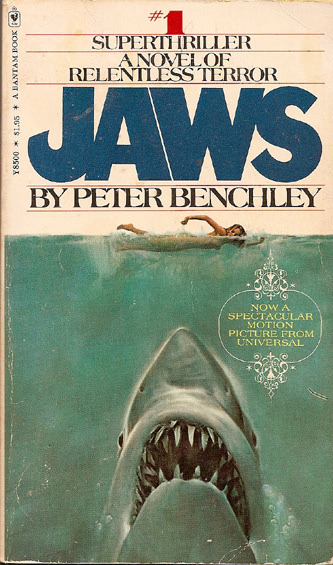
Is there a particular author you would like to meet in real life?
You didn't mention alive or dead. All three of my answers, are dead.
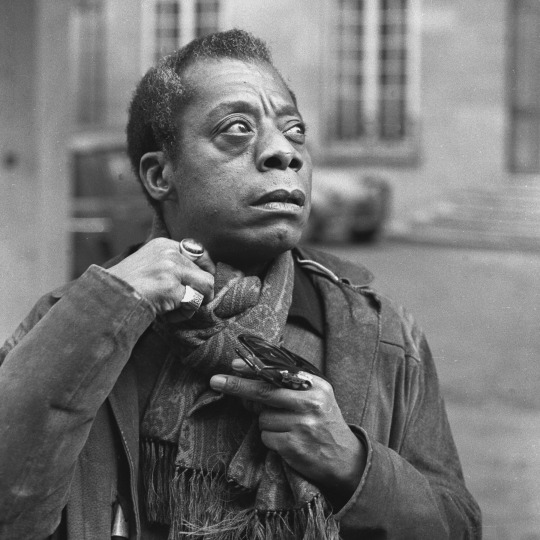
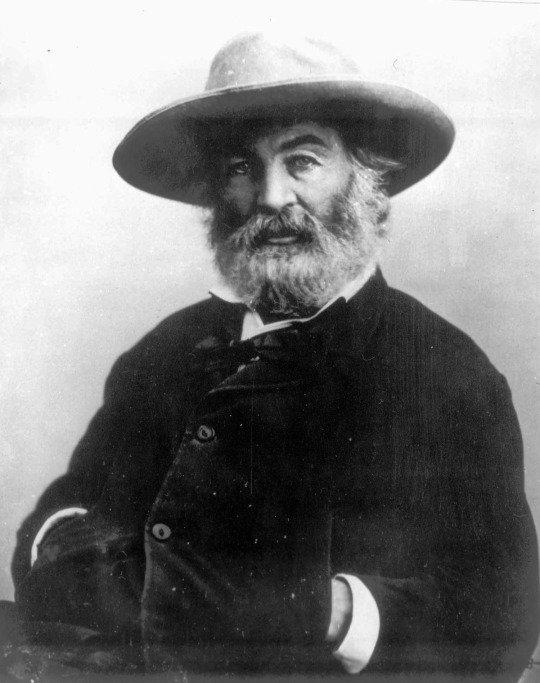
The first author that came to my mind is James Baldwin! Simply because he is so sexy! I want to do naughty sexy things with him. Intelligence is so hot.
The second author that came to mind is Walt Whitman. I want to be his friend! I think we have a lot in common (spiritually) and I would love to know the conversations we would have together talking about nature, love, life, the cosmos, the spirit, and Abraham Lincoln. (He totally had a thing for Abe.)
The third author that came to mind, most people have never heard of before. His name is Alexander Key. He is most famous for writing the book that the Disney movie "Escape to Witch Mountain" was based on.
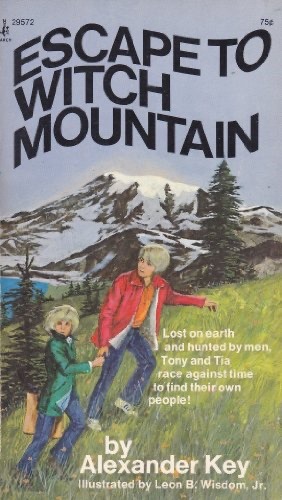
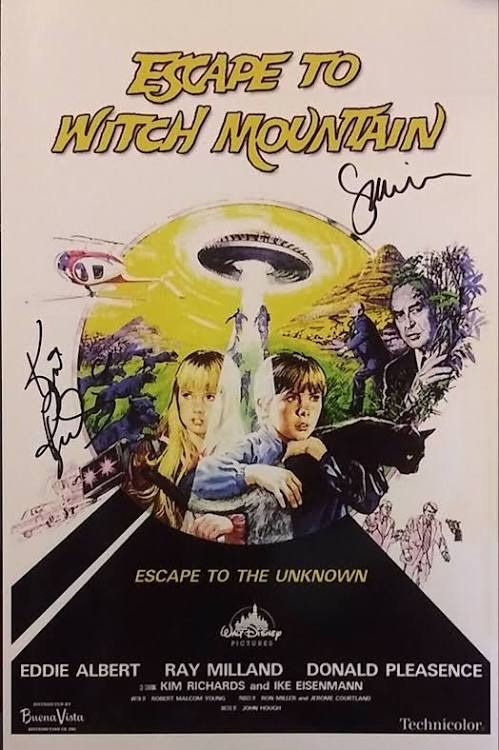
I have read almost all of his books (they are out of print and difficult to come by) and I have also collected some of the books where he provided the illustrations. Almost all of his books have a magical / fantastical / science fiction element to them - like kids who are aliens or from other dimensions, or kids who have encounters with unusual phenomena or they discover they have hidden magical abilities. And he even wrote a non-fiction book, "The Strange White Doves" filled with true stories about how animals have ESP! There is even a chapter about how trees have ESP! He published his first book in 1930! And I just know, he writes so much about magical / mystical encounters, that he must have had some real life experiences himself. I would love to know what inspired a lifetime spent writing for children about how they have untapped magic inside of them.
I just opened my copy of "The Strange White Doves" (published in 1972) and on the book jacket Alexander Key is quoted as saying, "Man has become so self-centered and destructive that there is very little hope for him or his planet." Then he adds, "If enough young people can see the truth, there IS hope."
What is this "Truth" he speaks of??? I'd love to get inside of his mind and know what he knows.
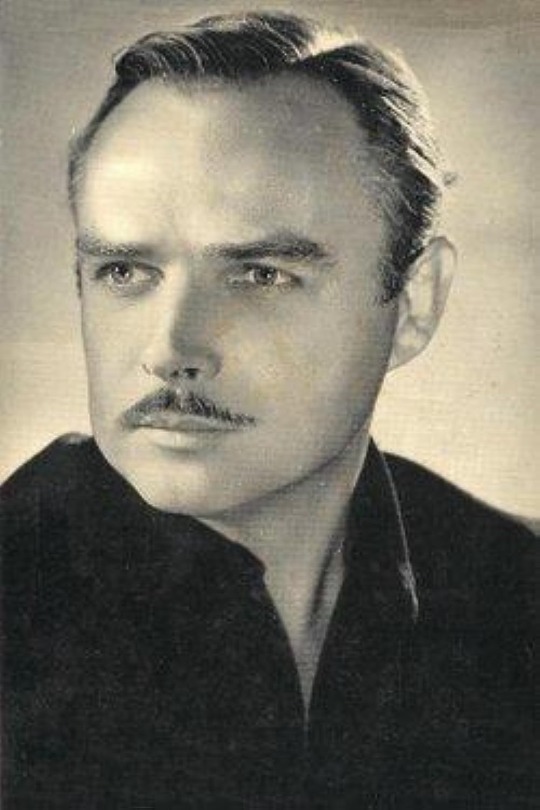
What book are you reading right now?
You know I always have several books going at one time! Here is my current pile:
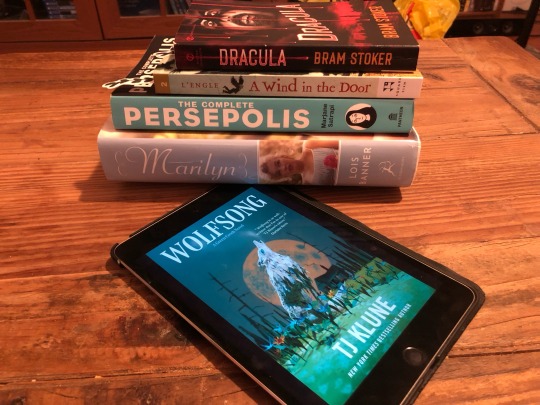
"Dracula" by Bram Stoker
"A Wind in the Door" by Madeleine L'Engle
"The Complete Persepolis" by Marjane Satrapi
"Marilyn: The Passion and the Paradox" a biography about Marilyn Monroe by Lois Banner
"Wolfsong" by TJ Klune
I love you, friend! Thank you for asking! I appreciate your friendship.
P.S. In case anyone is interested in more information about Alexander Key, here is a link to his Wikipedia entry.
9 notes
·
View notes
Text
Reading List
to be updated constantly
Articles:
"Why Women Online Can’t Stop Reading Fairy Porn" by C.T. Jones for Rolling Stone
"They Called 911 for Help. Police and Prosecutors Used a New Junk Science to Decide They Were Liars." by Brett Murphy for ProPublica
"‘I Think My Husband Is Trashing My Novel on Goodreads!’" by Emily Gould for The Cut
"Woman in Retrograde" by Isabel Cristo for The Cut
"The unwanted Spanish soccer kiss is textbook male chauvinism. Don’t excuse it" by Moira Donegan for the Guardian
"I Started the Media Men List" by Moira Donegan for The Cut
"What Moira Donegan Did for Young Women Writers" by Jordana Rosenfeld for The Nation
"The Key Detail Missing From the Narrative About O.J. and Race" by Joel Anderson for Slate
"The Coiled Ferocity of Zendaya" by Matt Zoller Seitz for Vulture
"OJ Simpson died the comfortable death in old age that Nicole Brown should have had" by Moira Donegan for The Guardian
"Norm Macdonald Was the Hater O.J. Simpson Could Never Outrun" by Miles Klee for Rolling Stone
"Trans Stylists and Makeup Artists Are Reshaping Red Carpet Looks. Will They Get the Credit They’re Due?" by James Factora
"The ‘perfect Aryan’ child used in Nazi propaganda was actually Jewish" by Terrence McCoy for The Washington Post
"There Are Too Many Books; Or, Publishing Shouldn’t Be All About Quantity" by Maris Kreizman for Literary Hub
"An O.J. Juror on What The People v. O.J. Simpson Got Right and Wrong" by Ashley Reese for Vulture
"Super Cute Please Like" by Nicole Lipman for N + 1 Magazine
Essays:
Not That Bad: Dispatches from Rape Culture edited by Roxanne Gay
Creep: Accusations and Confessions by Myriam Gurba
"On Chappell Roan and Gen Z Pop" by Miranda Reinert
"In Memory of Nicole Brown Simpson" by Andrea Dworkin
"My Gender Is Dyke" by Alexandria Juarez for Autostraddle
"Columnists and Their Lives of Quiet Desperation" by Hamilton Nolan
Nonfiction:
Belabored: A Vindication of the Rights of Pregnant Women by Lyz Lenz
The Feminine Mystique by Betty Friedan
This American Ex-Wife: How I Ended My Marriage and Started My Life by Lyz Lenz
The Gentrification of the Mind: Witness to a Lost Imagination by Sarah Schulman
Savage Appetites: Four True Stories of Women, Crime, and Obsession by Rachel Monroe
The Sexual Politics of Meat: A Feminist-Vegetarian Critical Theory by Carol J. Adams
Eros the Bittersweet by Anne Carson
Who Owns This Sentence? A History of Copyrights and Wrongs by David Bellos & Alexandre Montagu
The Once and Future Sex: Going Medieval on Women's Roles in Society by Eleanor Janega
Moby Dyke: An Obsessive Quest to Track Down the Last Remaining Lesbian Bars in America by Krista Burton
University of Nike: How Corporate Cash Bought American Higher Education by Joshua Hunt
What it Feels Like for a Girl by Paris Lees
Female Masculinity by J. Jack Halberstam
The Theory of Everything Else: A Voyage Into the World of the Weird by Dan Schreiber
Stiff: The Curious Lives of Human Cadavers by Mary Roach
Better Living Through Birding: Notes from a Black Man in the Natural World by Christian Cooper
Rivermouth: A Chronicle of Language, Faith, and Migration by Alejandra Oliva
Unlikeable Female Characters: The Women Pop Culture Wants You to Hate by Anna Bogutskaya
Born a Crime: Stories From a South African Childhood by Trevor Noah
Caste: The Origins of Our Discontents by Isabel Wilkerson
The Lady from the Black Lagoon: Hollywood Monsters and the Lost Legacy of Milicent Patrick by Mallory O'Meara
Being Mortal: Medicine and What Matters in the End by Atul Gawande
Stone Butch Blues by Leslie Feinberg
Eyeliner: A Cultural History by Zahra Hankir
Against Technoableism: Rethinking Who Needs Improvement by Ashley Shew
The Wager: A Tale of Shipwreck, Mutiny and Murder by David Grann
Know My Name by Chanel Miller
Empire of Pain: The Secret History of the Sackler Dynasty by Patrick Radden Keefe
Novelist as a Vocation by Haruki Murakami
Rape-Revenge Films: A Critical Study by Alexandra Heller-Nicholas
Fiction:
To the Lighthouse by Virginia Woolf
Middlemarch by George Eliot
Just as You Are by Camille Kellogg
Just Happy to Be Here by Naomi Kanakia
The Misadventures of an Amateur Naturalist by Ceinwen Langley
Family Meal by Bryan Washington
Jurassic Park by Michael Crichton
The Mountain in the Sea by Ray Nayler
Ring Shout by P. Djèlí Clark
My Heart Is a Chainsaw by Stephen Graham Jones
An Island Princess Starts a Scandal by Adriana Herrera
Blackouts by Justin Torres
We Do What We Do in the Dark by Michelle Hart
Never Let Me Go by Kazuo Ishiguro
Less Is Lost by Andrew Sean Greer
The Faithless by C.L. Clark
Project Hail Mary by Andy Weir
The Poppy War by R.F. Kuang
The Disenchantments by Nina LaCour
Everything Leads to You by Nina LaCour
Bliss Montage by Ling Ma
Pachinko by Min Jin Lee
The Institute by Stephen King
Jonathan Strange & Mr Norrell by Susanna Clarke
Frankenstein: Junji Ito Story Collection by Junji Ito
Her Body and Other Parties: Stories by Carmen Maria Machado
Young Mungo by Douglas Stuart
The Dark Forest by Liu Cixin
Snuff by Terry Pratchett
Travelers Along the Way: A Robin Hood Remix by Aminah Mae Safi
Only a Monster by Vanessa Len
4 notes
·
View notes
Text
Spoilers under the cut:
Word up to the people who are going to be pissed because they thought this episode was going to be about Blitz and Stolas confronting their issues even though Viv said last August this episode wasn’t all tied to episode 7 and we didn’t need it to understand season 2.
I love hellhound designs. Just. All of them.
HATSUNE MIKU DALMATION HELLHOUND YOU’RE ADORABLE.
Bitchy poodle has two lines of dialogue and they’re both memes and that’s kind of excellent.
Also please give us more about the beef these two have. So Loona has had other interactions with hellhounds, they just... went badly?
IS THAT KESHA?
YEP THAT’S GOTTA BE KESHA.
... So the theory about this episode being on hold because of something to do with Kesha was right?
2:50 I AM IN LOVE.
I’m sure there’s going to be some people out there who are angry she’s not a full on bee or dislike other aspects of her design but I DO NOT CARE SHE IS PERFECT I WILL FIGHT FOR HER UNTIL THE DAY I DIE. THIS IS MY WIFE NOW.
3:18 Yep I’m a furry now.
Did... did anyone predict Vortex’s girlfriend would be one of the sins? GET IT, BOI.
Blitz immediately shutting down his breakdown to go get his daughter when she needs him is the most dad thing he’s ever done and made me cry a little bit because that shit hits home.
Is Edward Bosco voicing like... every single guy that isn’t Vortex? The man is a treasure.
James Monroe Iglehart’s voice is freakin’ ASMR.
Blitz just out-gluttonyed the embodiment of gluttony what is this man made out of.
SHE CALLED HIM DAD.
Bee, my darling, light of my life (step on me please) how can you tell that Blitz is all kinds of not okay but can’t tell Loona’s eight different kinds of jealous of you?
HOLY SHIT SHE’S HOTTER NOW SHE’S BIGGER AND HOTTER OMG.
RIP Dennis. I liked your shirt and your little sheep-esque vibes.
RIP Alejandro. You seemed cool.
Blitz and Loona having a moment is adorable. <3
Someone out there is angry Loona didn’t try to talk to him more but considering she likely has no idea how to handle that, I think she did okay.
9 notes
·
View notes
Text

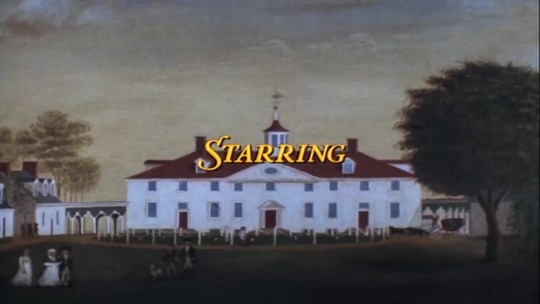

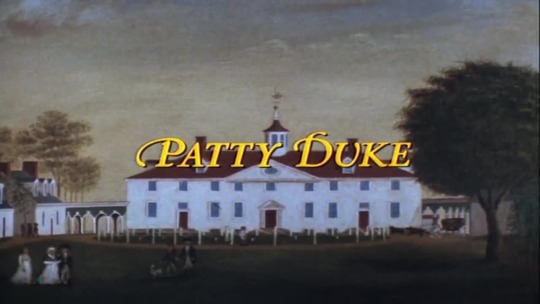
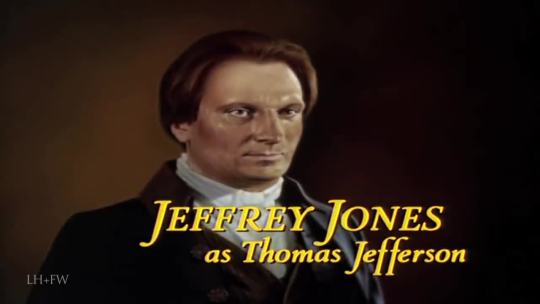


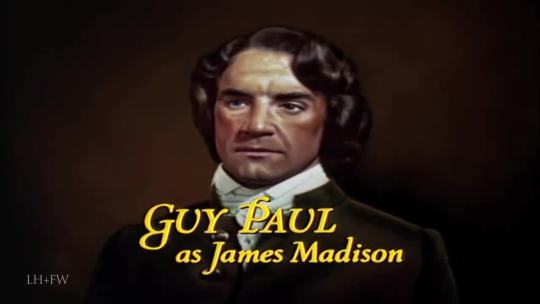
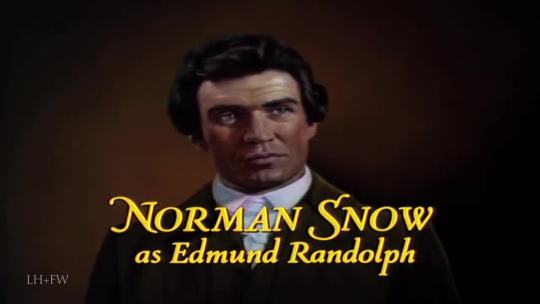
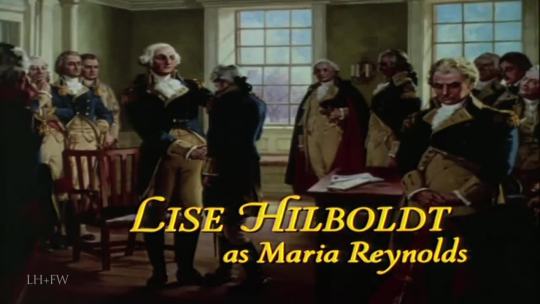
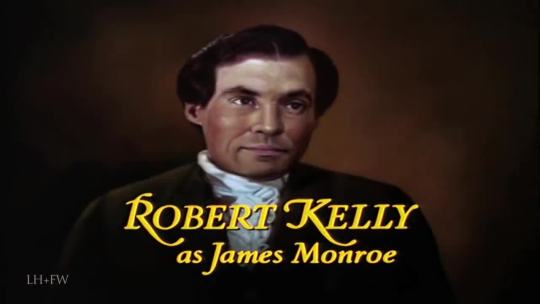




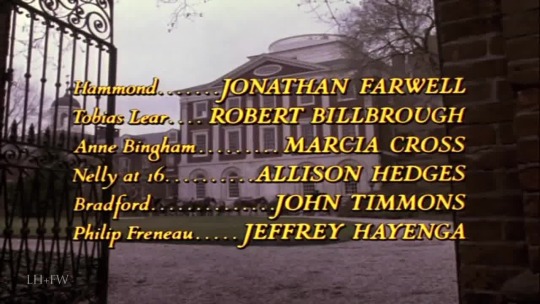
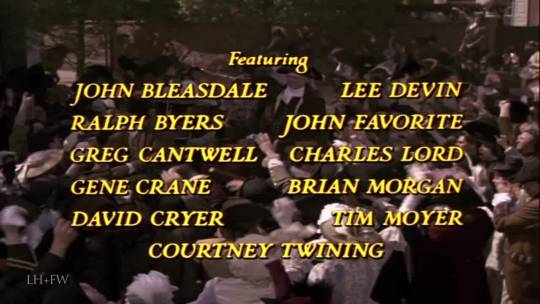

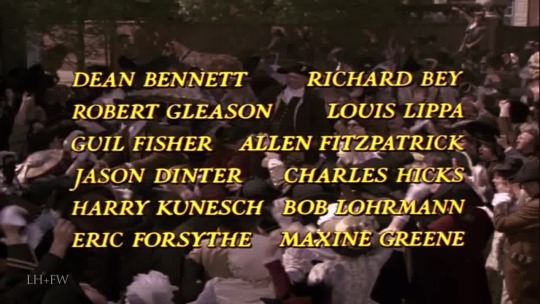

George Washington II: The Forging of a Nation - CBS - September 21-22, 1986
Historical Drama (2 episodes)
Running Time: 190 minutes
Stars:
Barry Bostwick as George Washington – Commander-in-Chief of the Continental Army, and later first President of the United States
Patty Duke Astin as Martha Washington – Wife of George Washington
Jeffrey Jones as Thomas Jefferson
Richard Bekins as Alexander Hamilton
Penny Fuller as Eliza Powel
Eve Gordon as Elizabeth Schuyler Hamilton
Marcia Cross as Anne Bingham
Guy Paul as James Madison
Norman Snow as Edmund Randolph
Robert Kelly as James Monroe
Lise Hilboldt as Maria Reynolds
Haviland Morris as Henrietta Liston
Daniel Davis as Patrick Henry
Richard Fancy as William Duer
Farnham Scott as Henry Knox
Nicholas Kepros as John Jay
#George Washington II: The Forging of a Nation#TV#1986#Historical Drama#CBS#Barry Bostwick#Patty Duke#Jeffrey Jones#Daniel Davis#Richard Bekins#Penny Fuller#Guy Paul#Robert Kelly
9 notes
·
View notes